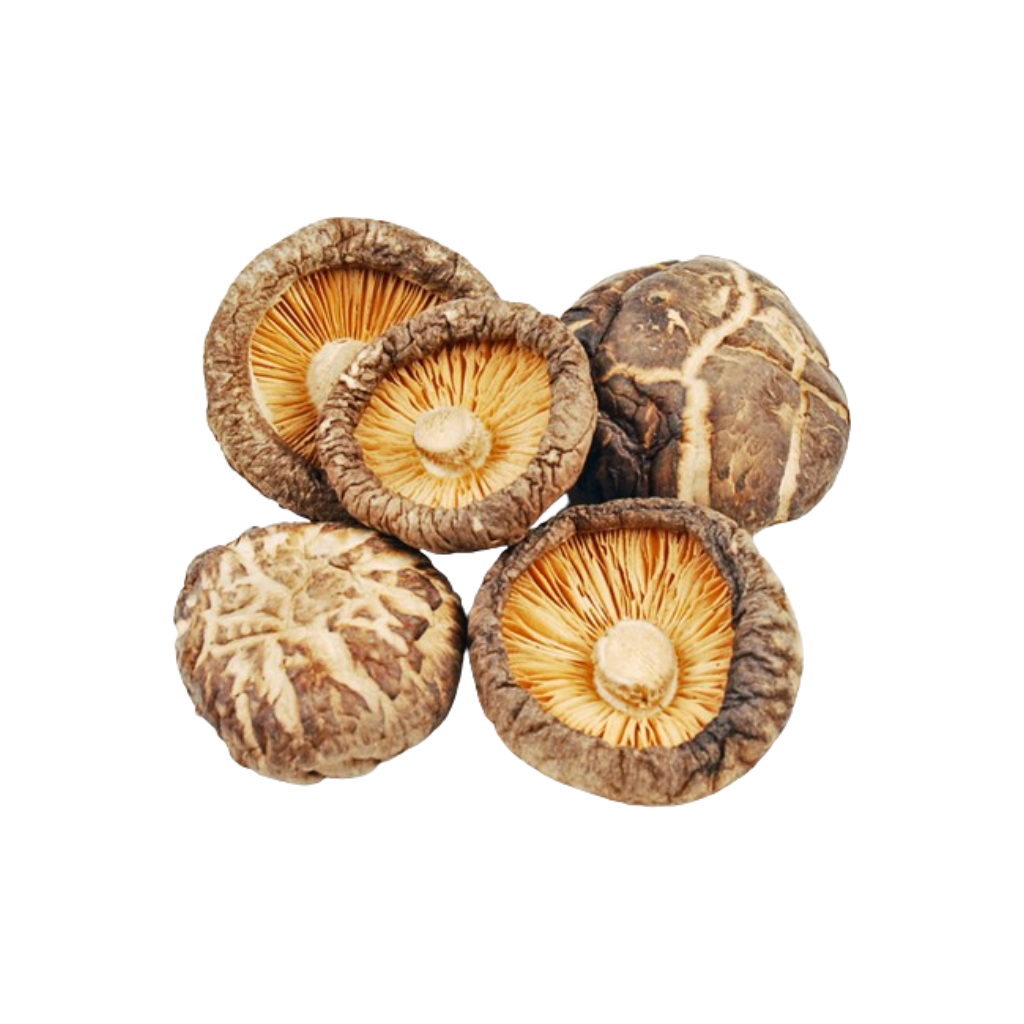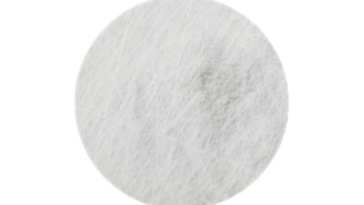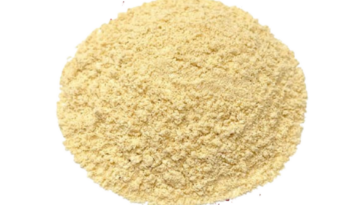Discover the culinary marvel of Shiitake mushrooms (Lentinula edodes), an esteemed edible fungus originating from the verdant landscapes of East Asia, notably Japan, Korea, and China. Renowned for its rich umami flavor and myriad health benefits, Shiitake mushrooms stand tall as the second most sought-after mushroom variety worldwide, just behind the ubiquitous white button mushrooms.
Deeply rooted in East Asian cuisine and traditional medicine, Shiitake mushrooms have traversed centuries, revered for their delectable taste and medicinal properties. With a history steeped in Eastern culture, these mushrooms symbolize vitality, longevity, and culinary excellence.
Embrace the nutritional prowess of Shiitake mushrooms, as they pack a punch with essential vitamins, minerals, and antioxidants. Bursting with B-vitamins, iron, and selenium, these fungi bolster immunity, support cardiovascular health, and promote radiant skin. Moreover, their potent anti-inflammatory and anti-cancer properties make them a prized addition to a wholesome diet.
Elevate your culinary repertoire with the versatile allure of Shiitake mushrooms, prized for their robust flavor and meaty texture. Whether sautéed, stir-fried, grilled, or simmered in soups and stews, these fungi impart a delightful depth of flavor to an array of dishes, from hearty stir-fries to savory risottos and beyond.
Embark on a gastronomic journey with Shiitake mushrooms, where tradition meets innovation, and culinary excellence knows no bounds. Whether you’re a seasoned chef, a health enthusiast, or an adventurous foodie, embrace the savory delights and wellness wonders of Shiitake mushrooms, and savor the essence of East Asian cuisine, one delectable bite at a time.
Vitamins & Minerals:
Shiitake mushrooms, scientifically known as Lentinula edodes, offer a wealth of vitamins, minerals, and other beneficial compounds, making them not just delicious but also highly nutritious. Here’s a breakdown of the key components and their relationship with shiitake mushrooms:
- Vitamin B2 (Riboflavin): Shiitake mushrooms are a good source of riboflavin, crucial for energy production, metabolism, and maintaining healthy skin and eyes. This vitamin supports various metabolic processes, contributing to overall health.
- Vitamin B3 (Niacin): Niacin, found in shiitake mushrooms, aids in energy conversion, digestive system function, and promotes healthy skin, nerves, and brain function. It supports the body in utilizing nutrients efficiently.
- Vitamin B5 (Pantothenic Acid): Pantothenic acid is essential for synthesizing coenzyme A, which is involved in metabolic pathways like the Krebs cycle and fatty acid synthesis. Shiitake mushrooms provide this vital nutrient necessary for energy metabolism.
- Vitamin B6 (Pyridoxine): Pyridoxine, present in shiitake mushrooms, plays a key role in amino acid metabolism, neurotransmitter synthesis, and hemoglobin production. It contributes to various physiological functions, including cognitive health.
- Vitamin B7 (Biotin): Biotin, found in shiitake mushrooms, supports metabolism of macronutrients (carbohydrates, fats, proteins), gene regulation, and cell signaling, contributing to overall metabolic health.
- Vitamin B9 (Folic Acid): Folic acid, abundant in shiitake mushrooms, is crucial for DNA synthesis, cell division, and red blood cell production. Its presence is particularly important during pregnancy for fetal development.
- Vitamin D: Shiitake mushrooms are one of the rare plant-based sources of vitamin D. This vitamin supports calcium absorption, bone health, immune function, and cellular growth and differentiation.
- Amino Acids: Shiitake mushrooms provide essential amino acids necessary for protein synthesis, muscle repair, neurotransmitter production, and hormonal balance, supporting overall bodily functions.
- Copper: Copper, present in shiitake mushrooms, is involved in red blood cell formation, bone health, immune function, and nervous system function, contributing to overall health and vitality.
- Ergothioneine (antioxidant): Shiitake mushrooms contain ergothioneine, a potent antioxidant that protects cells from oxidative damage, reducing the risk of chronic diseases and supporting overall health.
- Iron: Iron, found in shiitake mushrooms, is vital for oxygen transport in the blood, energy production, and immune function, supporting overall vitality and well-being.
- Manganese: Manganese in shiitake mushrooms supports bone health, wound healing, carbohydrate and cholesterol metabolism, and acts as an antioxidant, contributing to overall health and vitality.
- Phosphorus: Shiitake mushrooms contain phosphorus, important for bone and teeth health, energy production, DNA synthesis, and cell signaling, supporting overall physiological functions.
- Potassium: Potassium, present in shiitake mushrooms, is essential for fluid balance, nerve transmission, muscle contraction, and blood pressure regulation, supporting overall cardiovascular and neurological health.
- Selenium: Selenium, found in shiitake mushrooms, acts as a potent antioxidant, supports thyroid function, and boosts immune response, contributing to overall health and well-being.
- Zinc: Shiitake mushrooms provide zinc, essential for immune function, wound healing, DNA synthesis, and sensory perception, supporting overall health and vitality, including reproductive health and growth.
In summary, shiitake mushrooms are a powerhouse of essential vitamins, minerals, and beneficial compounds that contribute to overall health, vitality, and well-being. Integrating them into a balanced diet can provide numerous health benefits and support various bodily functions.
Probiotic, Prebiotic, or Postbiotic:
Shiitake mushrooms are not typically classified as probiotics, prebiotics, or postbiotics. Probiotics are live microorganisms that confer a health benefit when consumed in adequate amounts, often found in fermented foods like yogurt and kimchi. Prebiotics are non-digestible fibers that nourish beneficial bacteria in the gut, found in foods like onions, garlic, and bananas. Postbiotics are the metabolic byproducts of probiotics that also have health benefits, such as short-chain fatty acids.
Shiitake mushrooms, while they have many health benefits, don’t fit neatly into these categories. They contain various nutrients and bioactive compounds that can support overall health, including immune function, but they don’t contain live bacteria like probiotics, nor do they provide specific fibers like prebiotics. Instead, they contribute to a healthy diet and can indirectly support gut health through their nutritional properties.
Dietary & Health Information:
Shiitake mushrooms, scientifically known as Lentinula edodes, are gaining popularity not only for their delicious taste but also for their numerous potential health benefits. With a low-calorie count, shiitake mushrooms are an excellent choice for individuals focused on managing their weight while still enjoying flavorful meals. Moreover, their high protein content makes them a favored option among vegetarians and vegans seeking to increase their protein intake without relying on animal products. Additionally, these mushrooms are a rich source of dietary fiber, essential for maintaining digestive health and supporting weight management efforts. With their impressive nutritional profile, incorporating shiitake mushrooms into your diet can provide a significant boost to your overall health and well-being.
In terms of health benefits, shiitake mushrooms are a powerhouse of nutrients that can bolster immune function and combat inflammation. Their beta-glucan content supports immune health by stimulating the activity of certain immune cells, potentially enhancing the body’s defense against infections and illnesses. Furthermore, the antioxidants present in shiitake mushrooms, such as selenium and vitamin E, play a crucial role in protecting cells from oxidative stress and reducing inflammation, which is beneficial for overall health. Research also suggests that consuming shiitake mushrooms may contribute to heart health by helping to lower cholesterol levels and reduce the risk of cardiovascular disease, thanks to their fiber content and compounds like eritadenine.
Incorporating shiitake mushrooms into your diet is easy and versatile. Whether sautéed, stir-fried, roasted, or added to soups and stews, these mushrooms impart a rich, savory flavor to various dishes. Moreover, dried shiitake mushrooms can be rehydrated and used in cooking, offering convenience without compromising taste or nutritional value. For those seeking a more convenient option, shiitake mushroom supplements are also available, providing a concentrated source of their potential health benefits. Overall, integrating shiitake mushrooms into your culinary repertoire not only enhances the flavor and nutrition of your meals but also supports your journey toward better health and well-being.
Scientific Study:
National Institutes of Health (NIH) Shiitake Mushroom Research →




 No products in the cart.
No products in the cart.